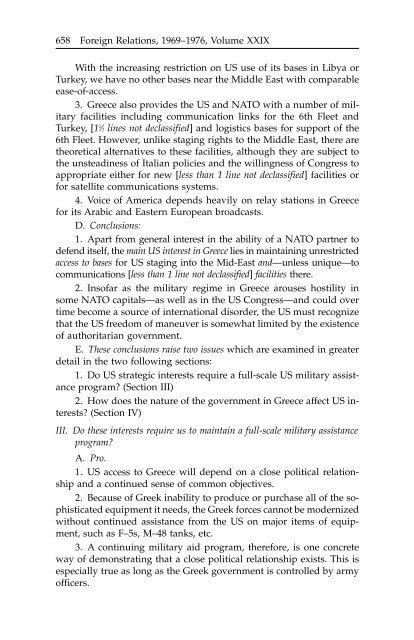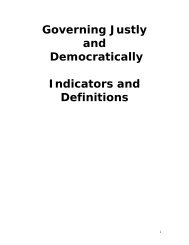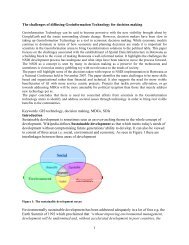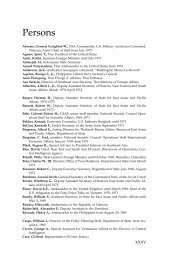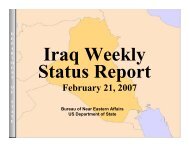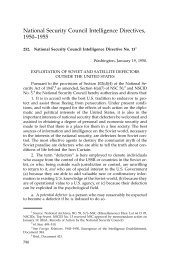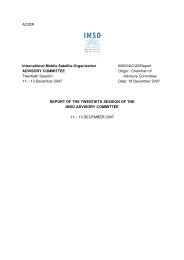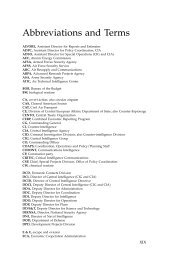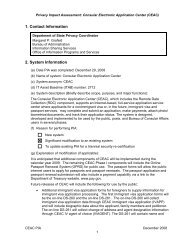Greece - US Department of State
Greece - US Department of State
Greece - US Department of State
Create successful ePaper yourself
Turn your PDF publications into a flip-book with our unique Google optimized e-Paper software.
658 Foreign Relations, 1969–1976, Volume XXIX<br />
With the increasing restriction on <strong>US</strong> use <strong>of</strong> its bases in Libya or<br />
Turkey, we have no other bases near the Middle East with comparable<br />
ease-<strong>of</strong>-access.<br />
3. <strong>Greece</strong> also provides the <strong>US</strong> and NATO with a number <strong>of</strong> military<br />
facilities including communication links for the 6th Fleet and<br />
Turkey, [1 1 ⁄2 lines not declassified] and logistics bases for support <strong>of</strong> the<br />
6th Fleet. However, unlike staging rights to the Middle East, there are<br />
theoretical alternatives to these facilities, although they are subject to<br />
the unsteadiness <strong>of</strong> Italian policies and the willingness <strong>of</strong> Congress to<br />
appropriate either for new [less than 1 line not declassified] facilities or<br />
for satellite communications systems.<br />
4. Voice <strong>of</strong> America depends heavily on relay stations in <strong>Greece</strong><br />
for its Arabic and Eastern European broadcasts.<br />
D. Conclusions:<br />
1. Apart from general interest in the ability <strong>of</strong> a NATO partner to<br />
defend itself, the main <strong>US</strong> interest in <strong>Greece</strong> lies in maintaining unrestricted<br />
access to bases for <strong>US</strong> staging into the Mid-East and—unless unique—to<br />
communications [less than 1 line not declassified] facilities there.<br />
2. Ins<strong>of</strong>ar as the military regime in <strong>Greece</strong> arouses hostility in<br />
some NATO capitals—as well as in the <strong>US</strong> Congress—and could over<br />
time become a source <strong>of</strong> international disorder, the <strong>US</strong> must recognize<br />
that the <strong>US</strong> freedom <strong>of</strong> maneuver is somewhat limited by the existence<br />
<strong>of</strong> authoritarian government.<br />
E. These conclusions raise two issues which are examined in greater<br />
detail in the two following sections:<br />
1. Do <strong>US</strong> strategic interests require a full-scale <strong>US</strong> military assistance<br />
program? (Section III)<br />
2. How does the nature <strong>of</strong> the government in <strong>Greece</strong> affect <strong>US</strong> interests?<br />
(Section IV)<br />
III. Do these interests require us to maintain a full-scale military assistance<br />
program?<br />
A. Pro.<br />
1. <strong>US</strong> access to <strong>Greece</strong> will depend on a close political relationship<br />
and a continued sense <strong>of</strong> common objectives.<br />
2. Because <strong>of</strong> Greek inability to produce or purchase all <strong>of</strong> the sophisticated<br />
equipment it needs, the Greek forces cannot be modernized<br />
without continued assistance from the <strong>US</strong> on major items <strong>of</strong> equipment,<br />
such as F–5s, M–48 tanks, etc.<br />
3. A continuing military aid program, therefore, is one concrete<br />
way <strong>of</strong> demonstrating that a close political relationship exists. This is<br />
especially true as long as the Greek government is controlled by army<br />
<strong>of</strong>ficers.


